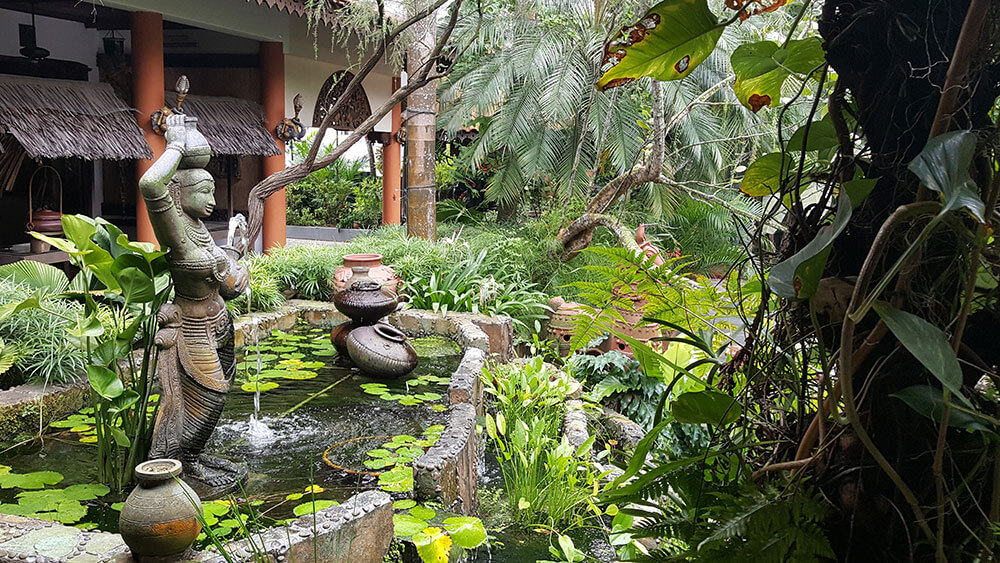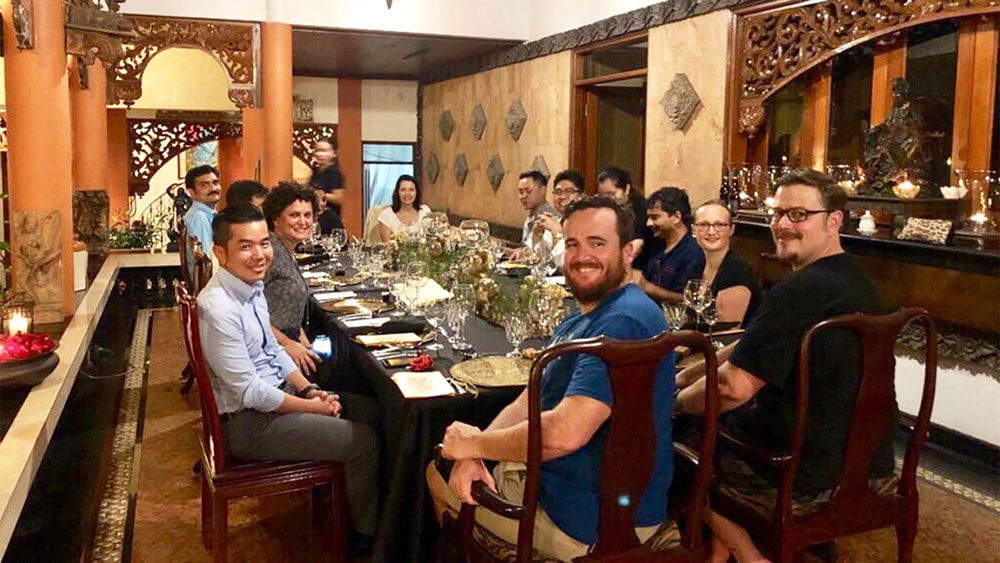
Indra Rani’s yard in Binjai Park, Singapore, is filled with verandas that encircle lush courtyards overflowing with flowers and water features. Rani serves her NOSHtrekker guests homemade meals at her home. (Courtesy NOSHtrekker)
Author: Gina Sin
From market gains to concerns about safety, here’s a look at key trends from the Incentive Research Foundation’s (IRF) 2019 Trends Study that are expected to affect the incentive travel industry this year.
Mergers and Acquisitions
Market growth will continue to push mergers and acquisitions on all fronts, according to the study. Marriott’s acquisition of Starwood and AccorHotels’ purchase of Fairmont Raffles Hotels International (FRHI) in 2016 were high-profile examples. And last year, Wyndham Worldwide bought La Quinta, Hyatt purchased Two Roads Hospitality, Mandarin Oriental became part of Waldorf Astoria, and Cvent merged with Lanyon. Additionally, Aventri (formerly etouches) made three acquisitions over the past two years, the study notes.

Atika Rosli
Some have blamed the Marriott-Starwood merger for Marriott International’s decision last year to cut commissions for third-party planners. But Atika Rosli, MICE business development manager at Singapore-based 8th Wave, a destination management company, said she believes there’s a silver lining.
“The acquisition provides us with a greater opportunity to redeem our reward points,” she said. “Overall, we feel that there are more benefits opened up to us planners.”
In February, meanwhile, M&A activity moved into the venue-management arena with the announcement that AEG Facilities and SMG plan to join forces. And consolidation is set to increase among incentive houses as well, a sector where Creative Group acquired The Performance Group; ITA Group acquired Hartmann Studios, an experiential design and production agency; Pacific World was sold to TUI; and BI Worldwide acquired Bunchball.
Security Concerns
Personal security and data security remain top concerns for buyers and sellers involved in planning incentive travel programmes, according to the IRF study. The 2018 Incentive Travel Industry Index by SITE, IRF Outlook, and Financial & Insurance Conference Professionals (FICP) found that most buyers (68 percent) and sellers (62 percent) believe the threat of terrorism is a major concern.
“The industry has taken this concern very seriously,” the 2019 IRF study notes, “with a host of organizations stepping forward to create resources to assist with planning and ensuring ‘duty of care’ requirements are met for planners.”
Rosli said preparation and awareness are crucial.
“We implement a risk analysis assessment and discuss a backup plan with our clients when organising events in the APAC region,” she said. “This boosts clients’ confidence in holding events in Asia with us.”
Data theft is another concern. Following breaches at companies including Marriott International and Cathay Pacific, the report notes that understanding the mechanics of data security is key.

Kenny Goh
The European Union’s General Data Protection Regulation (GDPR), Singapore’s recently updated Personal Data Protection Act (PDPA), and California’s digital privacy law, set to go into effect in January 2020, “are most likely precursors to sweeping changes in data security, which will become paramount in the next five years,” the report notes.
Kenny Goh, founder of event technology company, MICE Neurol, said he believes many event professionals in the Asia Pacific region are still grappling with the new data protection laws.
“From my interactions, it is very obvious that the industry is overwhelmed by the new laws,” he said. “I believe many companies are compliant in managing staff personal data, but most event companies still don’t fully realise the extent of the new obligations when handling non-staff personal data.”
Incentive Travel on the Rise
Incentive travel growth is supported by expanding budgets, increased participant eligibility, and improved internal and public perceptions of incentive travel programmes, according to the 2018 Incentive Travel Industry Index, the 2019 report notes.
“One factor contributing to the rise of incentive travel is the C-suite’s growing realisation that profitable businesses employ strategic use of rewards and recognition,” the 2019 report states. “Increased executive buy-in — and growing public awareness of the proven effectiveness of incentives — is reflected” in a more positive perception of incentive travel as compared to a decade ago.
Transformational Experiences
In 2019, transformational travel will continue to have an impact on the incentive industry, according to the study. This incorporates concepts of wellness, sustainability, community, and personal fulfillment to create highly memorable and authentic experiences.
These transformative experiences can come in highly designed formats, such as NOSHTrekker’s Plantation Table dining experience, in which Singapore hostess Indra Rani serves a home-cooked meal. And where, NOSHTrekker says, the array of cocktails served “are inspired from the plantation days of old Malaya.”
8th Wave’s Rosli said she has had success creating local experiences across APAC through storytelling. These include a bonsai workshop hosted in the personal home of a bonsai master, and an encounter with one of the last joss stick makers in Penang, Malaysia, who also shared stories about his life.

A group from the mining company Rio Tinto sits down to dinner at Plantation Table. (Courtesy NOSHtrekker)
